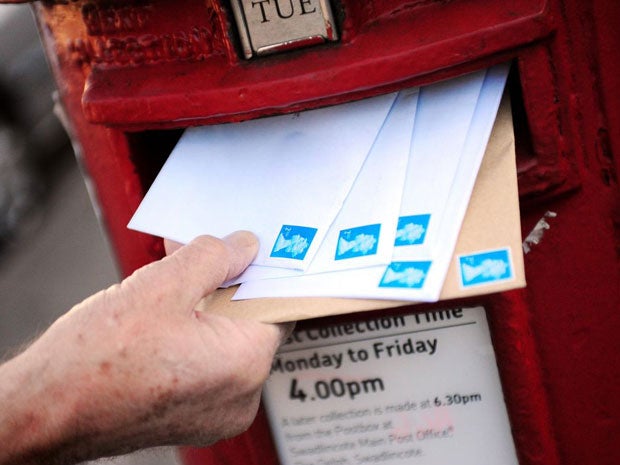Stamp prices soar to record highs

The cost of posting letters is to increase to record levels after the Royal Mail announced a 14p increase in the cost of first and second-class stamps to 60p and 50p.
The postal group warned that the universal service, under which post is delivered to any house in the UK for the same price, was in "peril" without higher stamp prices.
Chief executive Moya Greene said; "This is a very high-quality, cherished service, but it needs to be paid for. The increase will restore our finances and maintain the universal service. We had no alternative but to increase prices."
Ms Greene said research showed the average household spent 50p a week on stamps, so she believed there was no "affordability issue" with higher prices.
"We know how hard it is for households and businesses when our economy is as tough as it is now. No-one likes to raise prices in the current economic climate but, regretfully, we have no option.
"Royal Mail provides one of the highest-quality postal services in Europe for amongst the lowest prices for both consumers and business.
"That service is under threat from declining volume, e-substitution and ever-increasing competition."
The Government said the top priority was to protect the universal service, while a consumer group said the Royal Mail could not rely on pushing up prices to turn around its fortunes.
Prices will rise from the current 46p for first class and 36p for second class from April 30, while the cost of posting large letters will increase from 75p to 90p for first class and 58p to 69p for second class.
The increases followed a decision by regulator Ofcom to give Royal Mail the freedom to set its own prices.
Royal Mail said that even after the increases, second-class stamps will still be the cheapest in Europe while first class will be the fifth lowest.
The Royal Mail also announced that millions of people on low incomes will be able to buy up to 36 stamps for Christmas at the current price.
Around five million people on pension credit and employment and support allowance or incapacity benefit will be eligible for the Christmas scheme, offering them the chance to buy up to three books of 12 stamps at 2011 prices.
Over the last four years, Royal Mail has made a loss in its core mails business, including packets, of almost £1 billion.
It said there had been a "significant deterioration" in its finances, blaming artificially low prices, falling volumes and less mail being delivered to an increasing number of addresses - up from 27 million to 29 million since 2003.
Mail volumes fell by 25% in six years and are expected to decline by around 5% a year for the foreseeable future.
Royal Mail also pointed out that service standards in the UK are "appreciably higher" than in many other EU countries, with deliveries over six days against an EU minimum obligation of five days, and a next-day target of 93%, the highest for any major European country.
Ofcom said that, subject to the safeguards it is putting in place, Royal Mail will make decisions on the price of stamps, not the regulator, adding that it had put a cap on the price of second-class stamps for standard letters to protect vulnerable consumers.
Over the next seven years, this will ensure that Royal Mail can price second-class stamps no higher than 55p.
"The central aim of the decisions announced today is to ensure that Royal Mail's universal service obligation (USO) is financially sustainable and provided efficiently.
"Without regulatory changes, there is a risk that Royal Mail may not be able to continue to deliver the USO to the same standard as today," said an Ofcom statement.
Billy Hayes, general secretary of the Communication Workers Union, said: "Today's announcement is the natural progression towards full competition and privatisation of postal services where customers pay more and efficiencies are sought in the interests of profit not services.
"Commercial freedoms may be good for the company but it could come at the cost of affordability and access to services for many. Price rises are the inevitable result of competition."
Robert Hammond, of Consumer Focus, said: "I doubt anyone is going to think about the challenges facing Royal Mail when they are paying 60p for a first-class stamp. Unfortunately, the economics of Royal Mail meant that something had to give to maintain the universal service obligation."
Shadow postal affairs minister Ian Murray said: "An increase in the price of stamps will hit the elderly, vulnerable and millions of people who rely on the postal service, including small businesses and charities."
The Government is pressing ahead with privatising the Royal Mail in the face of continued opposition from unions representing postal workers.
PA
Join our commenting forum
Join thought-provoking conversations, follow other Independent readers and see their replies
Comments
Bookmark popover
Removed from bookmarks